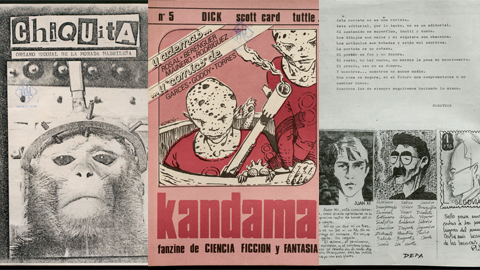The UAB launches a citizen experimentation laboratory on fanzines
The UAB Library Services offers the university community the possibility to participate in the citizen experimentation and prototype lab “Fanzins atemporals” (UAB), which will be held at the COMTEC Centre of the Communications Library and General Newspaper Archives and at the Faculty of Communication Studies on 7, 8 and 9 February, with the aim of finding new ways to rethink, reshape and reuse this collection made up of 849 fanzines.

"Not only do we want to disseminate the collection and give it visibility, but we also want it to become a significant documentary material to be used in class, in research work or in other UAB contexts, to understand a certain period, a certain phenomenon, etc. from a different perspective."
This laboratory is an initiative of the Library Service (UAB) and is supported by the Laboratorios Bibliotecarios project, promoted by the Subdirectorate General for Library Coordination (Spanish Ministry for Culture). This is the first experience of this kind of innovation and experimentation carried out by the Library Service. The laboratory is based on a specific theme, such as the Digital Collection of Fanzines deposited in the Digital Document Repository of the UAB (DDD), with the aim of collectively prototyping new uses of this collection (i.e. creating a project prior to a final product).
The call is aimed at the entire UAB university community and anyone interested in the subject. Participation in the laboratory is open and free of charge, subject to prior registration. The deadline will remain open until 17 January 2024. The laboratory will take place on Wednesday and Thursday 7 and 8 February from 9 a.m. to 5 p.m. at the COMTEC Centre of the Communications Library and General Newspaper Archives, and on Friday 9 February from 9 a.m. to 2 p.m. at the Sala de Graus of the Faculty of Communication Studies. The organisation will provide the necessary means to carry out the projects and will be responsible for the food expenses during the sessions.
The aim is to make this digitised collection known within the UAB university community so that it is the community itself that rethinks its uses and the way it wants to reuse it. "We start from the idea that the digitisation, visibility and collective creation of new uses for the UAB fanzine collection is a way of returning to the citizenship, through a public institution like our university, these works of collective creation, so that they can also be reinterpreted and reused collectively at the present time", says Meritxell Barea Molina, head of the working group that coordinates the initiative, formed by a team of nine people from the Libraries: Cristina Andreu Nebot, Olga Cano Llavero, Marina Carbonell Ferrando, Marta Civil i Serra, Raúl Coré Bradineras, Aida Fernandez García, Anna Maria Florensa Farré, Mónica González Gavara and Irina Olives Piris.
“No només volem difondre la col·lecció i donar-li visibilitat, sinó que volem que esdevingui un material documental significatiu que es faci servir a classe, en treballs de recerca o en d’altres contextos de la UAB, per comprendre des d’un altre prisma una determinada època, un determinat fenomen, etc.”, expliquen des del Servei de Biblioteques. “Volem que aquesta col·lecció es repensi, es reconfiguri i es reutilitzi de noves maneres; volem dotar-la, en definitiva, d’atemporalitat”, diuen.
"Not only do we want to disseminate the collection and give it visibility, but we also want it to become a significant documentary material to be used in class, in research work or in other UAB contexts, to understand a certain period, a certain phenomenon, etc. from a different perspective", explain members of the Library Service. "We want this collection to be rethought, reconfigured and reused in new ways; in short, we want to make it timeless," they say.
During the lab, participants will create several lines of work from which to start the prototyping process. Up to 40 people can participate in the lab, which will be divided into smaller groups, in addition to the mentors and organisers.
These lines are flexible and permeable to the decisions taken by each group during the development of the laboratory. It should be borne in mind that the proposed working methodology, the citizen laboratory, applies experimental logics and, therefore, the resulting prototypes will always be the result of horizontal and collaborative work with the participants.
A collection of 849 fanzines
The collection is made up of 849 fanzines self-published in contexts of cultural activism between 1970 and 2000, with a preeminent weight of fanzines published during the 1980s.
Their authorship is mainly collective and the contents are very heterogeneous, but they have in common that they address phenomena, bring out expressions and make actors visible who do not appear in the traditional media. They present a diversity of themes, languages and authorship, but they are all self-published and produced with few resources. The collection was compiled by Eugeni Giral, lecturer at the Faculty of Communication Studies.
The original documents are kept in the repositories of the Communication Library and the General Newspaper Archives, in 53 document containers totalling some 5.5 linear metres.